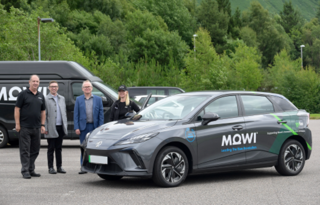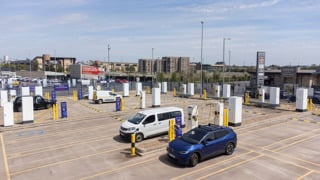Almost half (44%) of fleet vehicles are already electric and two thirds (66%) of companies have grown the number of electric vehicles (EVs) they operate in the past year, by an average of 19%, according to respondents to a Lex Autolease survey.
Three-quarters (75%) of the 100 fleet managers surveyed (each operating more than 100 vehicles) also reported their adoption of EVs is being driven, in part, by employee recruitment and retention.
Two thirds (67%) said electrifying their fleet was important for their sustainability targets, while almost one-third (30%) cited lower maintenance and upkeep costs and the reduced noise of vehicles.
More than a quarter (26%) reported that the lower running costs of EVs compared to petrol or diesel vehicles had persuaded them to invest in plug-in vehicles.
Electric fleet increase
According to Lex Autolease’s Future of Transport report, the vehicle leasing giant expects to see similar growth in electric fleets to the previous year, with two thirds (67%) of fleet managers saying the number of electric vehicles in their fleet would increase, by an average 19%.

All of the fleet managers questioned said their fleet will ultimately be entirely electric at some point in time, though on average this will take until 2030 – the year that the sale of new petrol and diesel cars is to end.
Interestingly, almost a third (31%) of firms expect it will take a decade or more to go 100% electric and every one of the fleet managers Lex Autolease surveyed said there were barriers to them investing in EVs.
A third (33%) cite the availability of charging points. However, there is a concerted effort to improve the network and the number of charging points has increased by 35% in the past year.
Importantly, four-in-five (78%) fleet managers believe that there is already an adequate number of charge points.
Further factors of concern to fleet managers include battery charging times (29%), the limited supply of EVs (28%), the logistics of installing charging infrastructure at home (27%), the availability of second-hand EVs (25%), their upfront cost (24%) and the limited choice of models (21%).
Nick Williams, managing director of Lex Autolease, said: “The respondents to this survey agree that infrastructure is certainly an issue. And our data backs up the need to accelerate the rollout of appropriate charging points across the UK.
“That said, huge amounts of money have been committed to the future of transport and the sector is at an exciting inflection point in its evolution.
“Going forward, the Future of Transport Index will hold a mirror to the industry, providing a regular, reliable measure of its progress.”
Government has role to play
Fleet managers are clearly convinced that the Government has an important role to play in enabling the widespread adoption of EVs.
They think the most effective actions policymakers could take to further encourage their adoption among businesses would be to make funding or subsidies available, including for on-site charging (38%).
They would also like to see more investment in public charging infrastructure (34%), a fuel tax on company petrol and diesel vehicles (32%), increased plug-in grants for businesses (31%), more tax breaks for businesses adopting EV (31%) and better education about their business benefits (23%).
They would also like concrete commitments that allow them to invest with confidence.
While almost half (46%) of fleet managers think policymakers are doing enough to encourage EV adoption among businesses, the same proportion neither agree nor disagree.
And they all (100%) think the Government could do more to boost the uptake of EVs overall, among private drivers and businesses.





















Login to comment
Comments
No comments have been made yet.